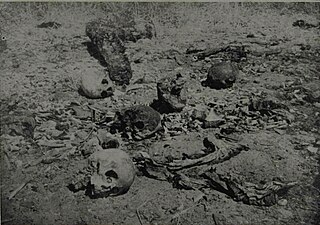
On 13 May 2015, eight gunmen attacked a bus travelling in Safoora Goth, Karachi, Sindh in Pakistan. The shooting left at least 46 people dead. All of the victims were of the Ismaili Shia Muslim minority, suggesting the attack was a targeted killing of sectarian nature.
The 2015 Kabul Parliament attack occurred on June 22, 2015, when members of the Taliban detonated a car bomb outside the National Assembly in Kabul then attacked the building with assault rifles and RPGs. Two civilians and seven Taliban died in the attack.

The Islamic State – Khorasan Province (ISIS–K) is a regional branch of the Islamic State terrorist group active in South-Central Asia, primarily Afghanistan. ISIS–K, like its sister branches in other regions, seeks to destabilize and overthrow existing governments of the historic Khorasan region in order to establish an Islamic caliphate under its strict, fundamentalist Islamist rule.
Shia Muslims have been persecuted by the Islamic State, an Islamic extremist group, since 2014. Persecutions have taken place in Iraq, Syria, and other parts of the world.
Events in the year 2017 in Afghanistan.
On 31 May 2017, a truck bomb exploded in a crowded intersection in Kabul, Afghanistan, near the German embassy at about 08:25 local time during rush hour, killing over 150 and injuring 413, mostly civilians, and damaging several buildings in the embassy. The attack was the deadliest terror attack to take place in Kabul. The diplomatic quarter—in which the attack took place—is one of the most heavily fortified areas in the city, with three-meter-high (10 ft) blast walls, and access requires passing through several checkpoints. The explosion created a crater about 4.5 meters (15 ft) wide and 30 feet deep. Afghanistan's intelligence agency NDS claimed that the blast was planned by the Haqqani Network. Although no group has claimed responsibility, the Afghan Taliban are also a suspect but they have denied involvement and condemned the attack. It was the single largest attack on the city up till that point.

The Islamic State–Taliban conflict is an ongoing armed conflict between the Islamic State and the Taliban in Afghanistan. The conflict escalated when militants who were affiliated with Islamic State – Khorasan Province killed Abdul Ghani, a senior Taliban commander in Logar province on 2 February 2015. Since then, the Taliban and IS-KP have engaged in clashes over the control of territory, mostly in eastern Afghanistan, but clashes have also occurred between the Taliban and IS-KP cells which are located in the north-west and south-west.
On 1 July 2019, a combined gun and bomb attack took place in the Wazir Akbar Khan neighborhood of Kabul, Afghanistan. The attackers initially detonated a bomb-laden truck, after which five gunmen entered a nearby building under construction and fired on Afghan security personnel evacuating people onto the street. At least forty-five were killed, including the five attackers. The spokesman for the Afghan Ministry of Public Health, Wahidullah Mayar, said that 116 civilians, including 26 children and 5 women, were wounded. The Taliban claimed the responsibility for the bomb attack in Kabul and said although civilians were not the Taliban target, some were injured.

On 28 July 2019, a suicide car bombing occurred in the Kabul office of the Vice Presidential candidate Amrullah Saleh. The bombing killed over 20 and injured over 50, including slightly wounding Saleh. Four gunmen then stormed the building and laid siege for hours before being killed.
Events in the year 2020 in Afghanistan.

On 25 March 2020, ISIS-Haqqani network gunmen and suicide bombers attacked the Gurdwara Har Rai Sahib in Kabul, Afghanistan.
In May 2020, a series of insurgent attacks took place in Afghanistan, starting when the Taliban killed 20 Afghan soldiers and wounded 29 others in Zari, Balkh and Grishk, Helmand on 1 and 3 May, respectively. On 12 May, a hospital's maternity ward in Kabul and a funeral in Kuz Kunar (Khewa), Nangarhar were attacked, resulting in the deaths of 56 people and injuries of 148 others, including newborn babies, mothers, nurses, and mourners. ISIL–KP claimed responsibility for the funeral bombing, but no insurgent group claimed responsibility for the hospital shooting.
In a continuation of previous attacks by the Taliban in May and June, multiple clashes between Afghan security forces and the Taliban were reported. They carried out several attacks throughout Afghanistan, resulting in multiple fatalities on both sides. Both the Taliban and government forces have accused each other responsibility over the recent surge in violence across Afghanistan. The attacks come despite the signing of a peace deal with the U.S. in February that was intended to put an end to the war.
The September 2020 Afghanistan attacks were a series of multiple attacks that occurred in September 2020. Resulting in at least 105 fatalities and another 112 injured. In addition 97 insurgents were killed and another 58 were injured in these attacks.
The October 2020 Afghanistan attacks were multiple attacks launched by insurgents including the Taliban and Islamic State of Iraq and the Levant – Khorasan Province in October 2020. The attacks left at least 243 people dead and 339 injured. 10 perpetrators were also killed in these attacks.
The November 2020 Afghanistan attacks were multiple attacks launched by insurgents including the Taliban and Islamic State of Iraq and the Levant – Khorasan Province in November 2020. The attacks left at least 88 people dead and more than 193 injured.






